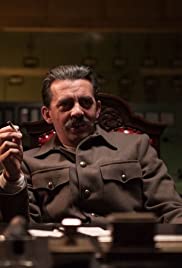
INSPECTION
Poland, 2018, 88 minutes, Colour.
Mariusz Ostrovski, Piotr Glowacki.
Directed by Jacek Raginis Krolikiwiecz.
This is a significant film for Polish memories. It has echoes of Polish independence, of domination by the Soviet Union, of the occupation by the Nazis during World War II.
It is also significant because it dramatises the massacre of Polish officers Zarubin, a self-made spy for Soviet officials. He is a theoretician, a mathematician, working on formulae for interrogation of prisoners. His criticised by authorities, and by Stalin (who appears, to disadvantage, during the film). Imprisoned, he is released by Stalin to continue his experiments, especially in a prisoner of war camp for Polish officers.
Zarubin is narcissistic, full of self-confidence, assumes his theories will be successful. He has a more benign approach to the officers, better food and conditions in the camp, conversations, discussions about their experiences in war and in academic circles, playing chess. He hopes to entice them to become informants.
The film explores the different reactions of some of the officials to is Zarubin’s outreach.
However, the decision is made that many of the officers will be chosen, transferred to Katyn and then, in the mass graves which we see being prepared, will be shot and buried.
At the same time, the director made the very interesting Day of Wrath, a television film focusing on the Nazi occupation, a monastery where the monks give shelter to a Jewish refugee, the repercussions, the action taking place in one day.
1. Television film? Style? Content?
2. Polish perspective on nationalism, socialism, the Stalin regime and ideology? The outbreak of the war?
3. The setting, 1939-1940, Stalin and his offices, prisons, executions? The prisoner of war camp? The finale in the district of Katyn?
4. Memories of Katyn? The Polish officers, imprisonment, Authorities, trying to win them over as informers? The allotment to different prisons, sending them to execution, the Russians, the trains, the massacre?
5. The portrait of Wasjili Zarubin? Background, Poland, Russia, German contacts? Proud to be a spy? His studies, questionnaires, mathematics, probabilities? The authorities in their attitude, disliking him? His audience with Stalin? Imprisonment? Treatment? And his release?
6. The Soviet authorities, ideology, the background of the 20s and 30s, famines in Ukraine, executions, Siberia? Stalin, his age, leadership, glimpses of personal idiosyncrasies? The various officials?
7. Zarubin, being reinstated, Stalin approving? His being sent to test his theories? Arrival in the camp, asserting his authority, personal manner? Arrogant? Self-confident? His testing his theories? The interviews with the range of Polish officers, with their backgrounds, praising them, showing interest in their subjects, the military, the general, the colonel, the professors? Playing chess, discussions, drink? Their responses? For and against?
8. The time in the camp, the effect on Zarubin and his personality, his drinking?
9. The seeming failure of his theories? The reaction of those he was testing?
10. The range of interviewees, the old general, the professor from Lithuania, the colonel…? The discussions amongst themselves? Knowing what was happening? Seeing them in their quarters, standing in the water…?
11. The offices, questions about their destination, the digging of the mass graves in Katyn? The aftermath, the disposal of the bodies?
12. Stalin, the relationship with Nazi Germany, collaboration, the Nazi attack, outbreak of war with Germany?
13. Zaarubin, the statistics, his seeming failure?